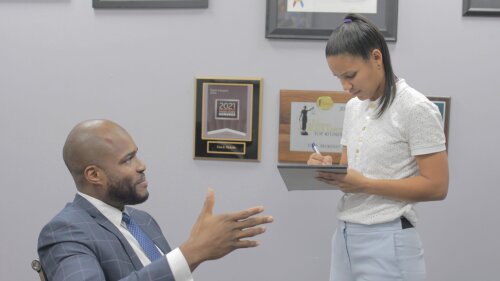Best Collaborative Law Lawyers in Missouri
Share your needs with us, get contacted by law firms.
Free. Takes 2 min.
Free Guide to Hiring a Family Lawyer
Or refine your search by selecting a city:
List of the best lawyers in Missouri, United States
About Collaborative Law in Missouri, United States
Collaborative Law is an alternative dispute resolution process that helps parties resolve legal matters without going to court. In Missouri, this process is most commonly used in family law cases such as divorce, child custody, and division of property, but it is also applicable to other civil disputes. The core principle of Collaborative Law is that both parties and their attorneys commit to resolving issues through cooperative negotiation rather than through litigation. The process prioritizes open communication, transparency, and mutually beneficial solutions.
Why You May Need a Lawyer
Collaborative Law is designed for people who want to resolve disputes amicably and minimize conflict. Common situations where you may require legal help in a collaborative setting include:
- Divorce or legal separation, particularly when children or complex assets are involved
- Determining child custody and visitation agreements
- Division of marital property and debts
- Spousal or child support negotiations
- Pre-marital or post-marital agreements
- Co-parenting plan development or modification
- Family-owned business disputes
- Non-family civil disputes where both parties seek a private solution
A lawyer's role in Collaborative Law is to provide legal guidance, ensure your interests are protected, and facilitate a structured process that can lead to a timely and less adversarial agreement.
Local Laws Overview
Missouri has adopted the Uniform Collaborative Law Act (UCLA), which sets out the legal framework for Collaborative Law participation. Here are some key aspects relevant to Missouri:
- Both parties must sign a "Collaborative Participation Agreement," acknowledging their intent to resolve the dispute outside of court.
- The process is voluntary, and parties are free to exit at any time.
- If the collaborative process fails, both parties must hire new legal counsel if they wish to proceed to litigation. Attorneys who participate in the collaborative process cannot represent clients in court for that dispute.
- All communication during the collaborative process is confidential and cannot be used as evidence if the case goes to court, except in situations where disclosure is required by law.
- The process encourages the use of neutral professionals, such as financial advisors or child specialists, to facilitate informed and fair agreements.
Collaborative Law in Missouri reflects the state's commitment to helping families and other parties resolve disputes with dignity and cooperation, while reducing emotional and financial strain.
Frequently Asked Questions
What is the difference between Collaborative Law and traditional divorce?
Collaborative Law focuses on cooperation and settlement outside of court, whereas traditional divorce can involve court battles and adversarial proceedings. Collaborative Law often results in quicker and more amicable resolutions.
Is Collaborative Law only for divorces?
No, although it is most common in family law, Collaborative Law can be used for other civil disputes where parties seek a private, negotiated resolution.
Are agreements reached through Collaborative Law legally binding?
Yes, once a settlement is reached, it is typically formalized into a legally binding contract or court order, enforceable by law.
What happens if we cannot reach an agreement through Collaborative Law?
If no agreement is reached, the collaborative process ends. Both parties must hire new attorneys if they decide to resolve the matter in court.
How long does the Collaborative Law process take?
The process generally takes less time than traditional litigation. Exact timeframes vary depending on how complex the issues are and the willingness of parties to cooperate.
Will I still need to go to court during Collaborative Law?
In most cases, no court appearances are necessary during the collaborative process. A brief court appearance may occur to finalize a divorce or file settlement documents, but litigation is avoided.
Can I switch to litigation after starting Collaborative Law?
Yes, but if you choose to exit the collaborative process, you will need to retain new legal representation to proceed in court.
What professionals are involved in the process?
Besides attorneys, the process often includes neutral professionals, such as child specialists, mental health professionals, or financial advisors, to help address specific aspects of the dispute.
How much does the Collaborative Law process cost?
Costs can vary but are generally lower than traditional litigation because the process tends to be more efficient and less adversarial. Each party is responsible for their own attorney's fees and shared costs for any neutral professionals.
How do I know if Collaborative Law is right for me?
Collaborative Law is a good fit if both parties are willing to negotiate openly and in good faith. It can be especially beneficial for families seeking to preserve relationships or privacy during dispute resolution.
Additional Resources
If you are interested in learning more or need support, the following organizations and resources can be helpful:
- Missouri Bar Association Family Law Section
- Collaborative Family Law Association of St. Louis
- Missouri Judiciary - Self Help Center
- Local county circuit courts' family court services
- Legal Services of Eastern Missouri and other statewide legal aid organizations
These organizations can help connect you with experienced collaborative law professionals and provide additional information on the process and your rights.
Next Steps
If you believe Collaborative Law may be an appropriate approach for your situation, consider the following steps:
- Consult with a Missouri attorney who is trained in Collaborative Law to discuss your specific circumstances and determine if the process is right for you.
- Discuss your intentions with the other party to confirm their willingness to participate in a collaborative process.
- Arrange a joint meeting with collaborative law attorneys and any necessary neutral professionals to outline goals and begin the formal process.
- Prepare relevant financial, property, and personal information to aid fair and transparent negotiations.
- Remain open to communication and cooperation, ensuring the process remains constructive and solution-focused.
Taking these steps with the guidance of an experienced collaborative law attorney can help protect your interests and facilitate a positive resolution to your legal matter.
Lawzana helps you find the best lawyers and law firms in Missouri through a curated and pre-screened list of qualified legal professionals. Our platform offers rankings and detailed profiles of attorneys and law firms, allowing you to compare based on practice areas, including Collaborative Law, experience, and client feedback.
Each profile includes a description of the firm's areas of practice, client reviews, team members and partners, year of establishment, spoken languages, office locations, contact information, social media presence, and any published articles or resources. Most firms on our platform speak English and are experienced in both local and international legal matters.
Get a quote from top-rated law firms in Missouri, United States — quickly, securely, and without unnecessary hassle.
Disclaimer:
The information provided on this page is for general informational purposes only and does not constitute legal advice. While we strive to ensure the accuracy and relevance of the content, legal information may change over time, and interpretations of the law can vary. You should always consult with a qualified legal professional for advice specific to your situation.
We disclaim all liability for actions taken or not taken based on the content of this page. If you believe any information is incorrect or outdated, please contact us, and we will review and update it where appropriate.
Browse collaborative law law firms by city in Missouri
Refine your search by selecting a city.















